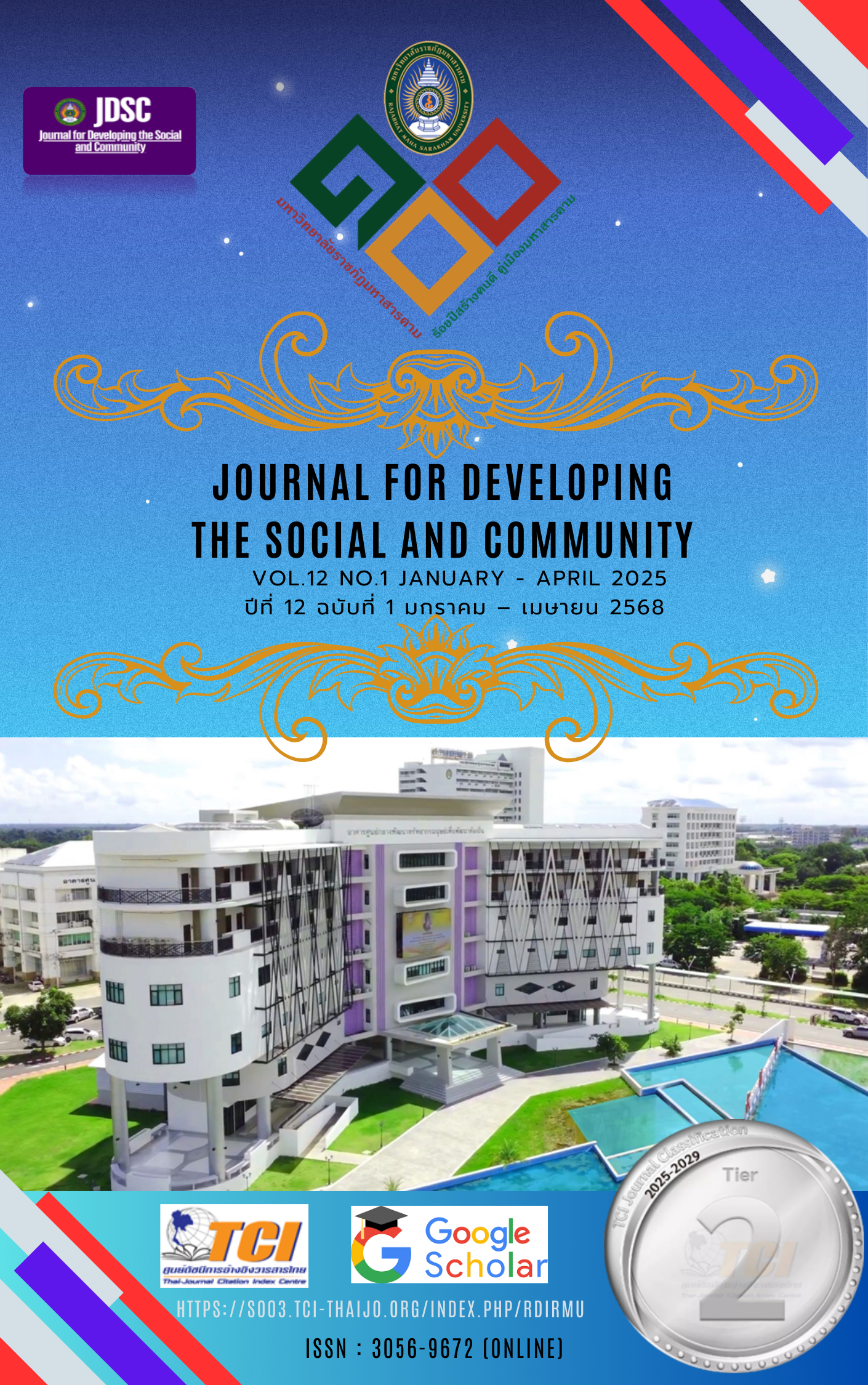Enhancing Fundamental Skills in International Music Notation Reading through Game-Based Learning: A Case Study of First-Year Students in The Music Program
Keywords:
Skill, Music notation reading, Game-Based LearningAbstract
Background and Aims: The objective of this research is to investigate the effects of developing undergraduate students’ international music notation reading skills through game-based learning and to compare these skills between the experimental and control groups.
Methodology: This study employs a quasi-experimental research design with a two-group pretest-posttest design. The participants are 30 undergraduate students majoring in music and music education who have no prior experience in reading international music notation. The sample is divided into two groups: 15 students in the control group and 15 students in the experimental group. The control group studied music notation reading through traditional documents and textbooks, while the experimental group developed music notation reading skills through game-based learning. Data collection instruments included pretest and posttest music notation reading assessments, as well as the "Note Teacher" application. Data were analyzed using t-test statistics.
Results: 1. After participating in the foundational skill enhancement program for reading international music notation through game-based learning, the experimental group demonstrated a significantly higher mean score in music notation reading skills (xˉ=79.43, SD=4.97) compared to their pretest score (xˉ=13.52, SD=7.23), with statistical significance at the .05 level of significance (t=26.33). rapeepan_28@hotmail.com
- 2. A comparison of posttest scores for music notation reading skills showed that the experimental group achieved a significantly higher mean score than the control group, also with statistical significance at the .05 level of significance.
Conclusion: The research findings indicate that game-based learning is more effective in developing international music notation reading skills than relying solely on textbooks and instructional materials. Integrating games into education not only enhances the enjoyment of learning but also fosters student engagement and promotes the development of essential skills such as problem-solving, decision-making, and collaboration—key competencies in the study of international music notation. Therefore, educators must design instructional activities that align with the learning objectives to ensure effective implementation of game-based learning strategies.
References
จันทร์ฉาย สุขสาร. (2564). ผลของเกมดิจิทัลเพื่อการศึกษาตามแนวคิดของ Robert Gagne’s ที่มีต่อความสามารถในการอ่านจับใจความของนักเรียนชั้นประถมศึกษาปีที่ 1 [วิทยานิพนธ์ปริญญามหาบัณฑิต]. มหาวิทยาลัยศิลปากร.
เจษฎา สุขสนิท. (2566). การใช้แอปพลิเคชันเกมดนตรีเพื่อพัฒนาการจดจำตำแหน่งตัวโน้ตดนตรีบนบรรทัด 5 เส้น ของนักศึกษาชั้นปีที่ 1 สาขาวิชาดนตรีศึกษา. วารสารวิชาการคณะมนุษยศาสตร์และสังคมศาสตร์ มหาวิทยาลัยราชภัฏเทพสตรี, 14(3), 103–116.
ณัฐศรัณย์ ทฤษฎิคุณ. (2567). การใช้สื่อเกมเพื่อการเรียนรู้ทฤษฎีดนตรีและโสตประสาทด้วยกระบวนการความคิดเชิงออกแบบสำหรับนักศึกษาดนตรีในระดับอุดมศึกษา. วารสารดนตรีบ้านสมเด็จเจ้าพระยา, 6(1), 67-82.
พรชุลี ลังกา. (2564). ผลของการจัดการเรียนรู้แบบเกมเป็นฐานท่มีีต่อผลสัมฤทธิ์ทางการเรียนของนักศึกษารายวิชาการศึกษาปฐมวัย. วารสารวิจัยทางการศึกษา, 16(1), 112-123.
สุวัทนา สงวนรัตน์, ชัยวัฒน์ วารี. (2566). เกมทางการศึกษา : ความสนุกสนานบนพื้นฐานทางวิชาการ. Journal of Roi Kaensarn Academi, 8(12), 754-772.
Burbules N.C., Fan G., Repp P. (2020). Five trends of education and technology in a sustainable future. Geography and Sustainability, 1(2), pp. 93-97.
Chun Qian, & Mingke Jiang. (2024). Exploring the Effects of Digital Game-Based Learning on Music Education. tudies in ocial cience ∓ umanities, 3(5), 6–9. etrieved from https://www.paradigmpress.org/SSSH/article/view/1118
Hartt, M., Hosseini, H. (2019). Exploration: From the Players Point of View. The Power of Play in Higher Education, 1(1), 263-271. https://doi.org/10.1007/978-3-319-95780-7_34
Hartt, M., Hosseini, H. (2020). Game on: Exploring the effectiveness of game-based learning.Planning Practice & Research, 35(5), pp. 589-604, 10.1080/02697459.2020.1778859
Richards, Jordan E. Montana. (2023). Discovering the Pedagogy and Secrets of Gamification and Game-Based Learning Applied to the Music Theory Classroom [Doctoral Dissertations] . Liberty University. https://digitalcommons.liberty.edu/doctoral/4738
Yu-Chen Liang, Ya-Ming Shiue, Yong-Ming Huang & Chuan-Gang Liu. (2016). Development of a digital game-based learning system in music learning [Paper presentation]. International Conference on Advanced Materials for Science and Engineering (ICAMSE), Tainan, Taiwan.
Downloads
Published
How to Cite
Issue
Section
License
Copyright (c) 2025 Journal for Developing the Social and Community

This work is licensed under a Creative Commons Attribution-NonCommercial-NoDerivatives 4.0 International License.
Articles that are published are copyrighted by the authors of the articles







